Related Research Articles
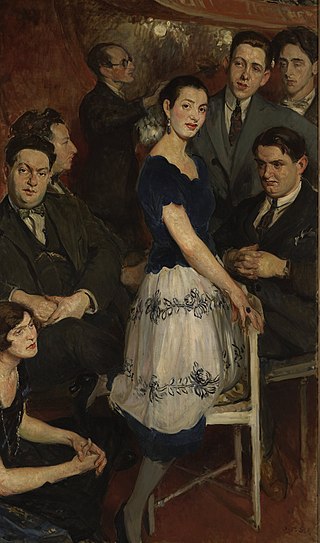
"Les Six" is a name given to a group of six composers, five of them French and one Swiss, who lived and worked in Montparnasse. The name has its origins in two 1920 articles by critic Henri Collet in Comœdia. Their music is often seen as a neoclassic reaction against both the musical style of Richard Wagner and the Impressionist music of Claude Debussy and Maurice Ravel.

Francis Jean Marcel Poulenc was a French composer and pianist. His compositions include songs, solo piano works, chamber music, choral pieces, operas, ballets, and orchestral concert music. Among the best-known are the piano suite Trois mouvements perpétuels (1919), the ballet Les biches (1923), the Concert champêtre (1928) for harpsichord and orchestra, the Organ Concerto (1938), the opera Dialogues des Carmélites (1957), and the Gloria (1959) for soprano, choir, and orchestra.
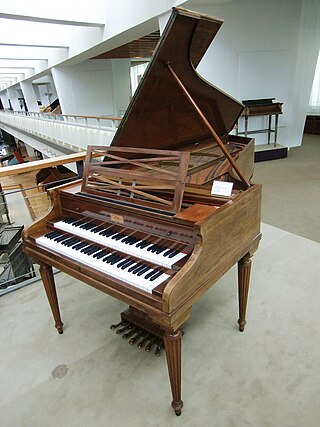
Concert champêtre, FP 49, is a harpsichord concerto by Francis Poulenc, which also exists in a version for piano solo with very slight changes in the solo part.

Alexis-Emmanuel Chabrier was a French Romantic composer and pianist. His bourgeois family did not approve of a musical career for him, and he studied law in Paris and then worked as a civil servant until the age of thirty-nine while immersing himself in the modernist artistic life of the French capital and composing in his spare time. From 1880 until his final illness he was a full-time composer.

Pierre Louis Bernac was a French singer, a baryton-martin, known as an interpreter of the French mélodie. He had a close artistic association with Francis Poulenc, with whom he performed in France and abroad. Poulenc wrote 90 songs for him during their 25-year musical partnership.
The Sonate pour flûte et piano, FP 164, by Francis Poulenc, is a three-movement work for flute and piano, written in 1957.
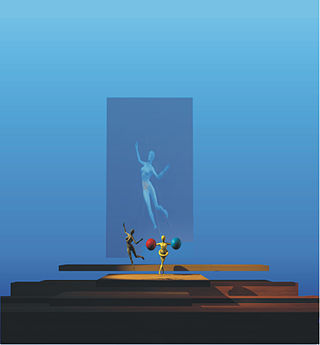
Les Mamelles de Tirésias is an opéra bouffe by Francis Poulenc, in a prologue and two acts based on the eponymous play by Guillaume Apollinaire. The opera was written in 1945 and first performed in 1947. Apollinaire's play, written in 1903, was revised with a sombre prologue by the time it premiered during World War I in France. For the opera, Poulenc incorporated both the farcical and the serious aspects of the original play, which according to one critic displays a "high-spirited topsy-turveydom" that conceals "a deeper and sadder theme – the need to repopulate and rediscover a France ravaged by war."
"Pancarte pour une porte d'entrée" is a cycle of eleven songs composed by Germaine Tailleferre to the poems of the novelist and poet Robert Pinget written in 1959. The work was published in 2000 by the French publishers Musik Fabrik.
Alice Theresa Hildagard Swanson Esty was an American actress, soprano and arts patron who commissioned works by members of Les Six and other French composers, and American composers such as Ned Rorem, Virgil Thomson. Claire Brook, and Marc Blitzstein, among others.
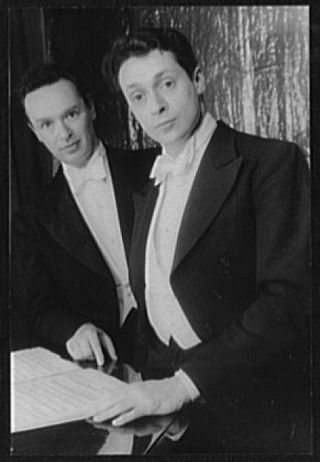
Arthur Gold and Robert Fizdale were an American two-piano ensemble; they were also authors and television cooking show hosts.
Marcel-François-Georges Delannoy was a French composer and critic. He wrote operas, ballets, orchestral works, vocal and chamber works, and film scores.
The Concerto pour orgue, cordes et timbales in G minor, FP 93, is an organ concerto composed by Francis Poulenc between 1934 and 1938. It has become one of the most frequently performed pieces of the genre not written in the Baroque period.
Quatre motets pour un temps de pénitence, FP 97, are four sacred motets composed by Francis Poulenc in 1938–39. He wrote them on Latin texts for penitence, scored for four unaccompanied voices.
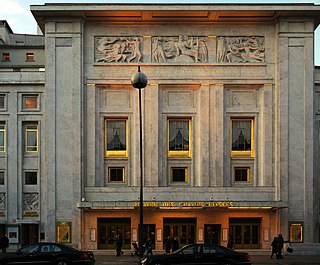
The Sonate pour clarinette et basson, FP 32a, is a piece of chamber music composed by Francis Poulenc in 1922.

The Sonate pour violon et piano, FP 119, by Francis Poulenc was composed in 1942–1943 in memory of the Spanish poet Federico García Lorca. The score, dedicated to Poulenc's niece Brigitte Manceaux, was published by Max Eschig. The work was premiered by the violinist Ginette Neveu with the composer at the piano on 21 June 1943 in Paris, Salle Gaveau.
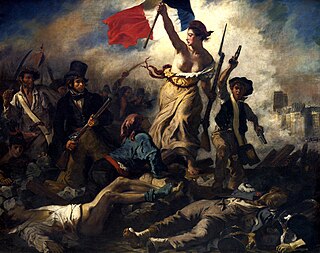
Figure humaine, FP 120, by Francis Poulenc is a cantata for double mixed choir of 12 voices composed in 1943 on texts by Paul Éluard including "'Liberté". Written during the Nazi occupation of France, it was premiered in London in English by the BBC in 1945. It was first performed in French in 1946 in Brussels, then in Paris on 22 May 1947. The work was published by Éditions Salabert. Cherished as the summit of the composer's work and a masterpiece by musical critics, the cantata is a hymn to Liberté, victorious over tyranny.
The Trio pour hautbois, basson et piano, FP 43, by Francis Poulenc is a three-movement chamber work, composed between 1924 and 1926, and premiered in the latter year.
The Chansons gaillardes FP 42, are a song cycle of eight pieces composed by Francis Poulenc in 1925–1926 "In euphoria and post-war" on anonymous texts of the 17th century. The work was dedicated to Mme Fernand Allard.

Chanson à boire,, FP 31, is a choral work by Francis Poulenc, composed in 1922 on an anonymous text of the 17th century for a four-part men's chorus a cappella. It was published first by Rouart-Lerolle, but today by Salabert.
References
- ↑ Description of the Alice Esty Papers at Bates College in Maine, url accessed August 22, 2006